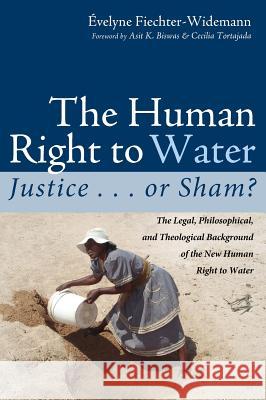The Human Right to Water: Justice . . . or Sham? » książka
The Human Right to Water: Justice . . . or Sham?
ISBN-13: 9781498294089 / Angielski / Twarda / 2017 / 426 str.
The Human Right to Water: Justice . . . or Sham?
ISBN-13: 9781498294089 / Angielski / Twarda / 2017 / 426 str.
(netto: 313,62 VAT: 5%)
Najniższa cena z 30 dni: 327,47
ok. 16-18 dni roboczych.
Darmowa dostawa!
Water is a matter of life and death. Advanced technology and engineering enable humans to gain better access to it. Nonetheless, the conditions and effort required to reach this goal remain colossal in many countries. Building a lasting infrastructure for adequate treatment before and after use is costly. Therefore, the author believes that a radical change of thinking among people around the world, from the domestic to the large-scale users, becomes a priority. Even if the United Nations entitles all people to justice for water, more responsible and ethical use of it by all interested parties is more important than the spreading of promises, which, in practice, may turn out to be a sham. Only a better understanding that access to water rests on the efforts of everyone, without exception, will reduce overuse, waste, and pollution of the indispensable resource.This volume, while written from a theological, philosophical, and legal perspective (focusing on John Calvin, John Rawls, and Paul Ricoeur), demonstrates that water cannot be merely understood as a human right, but also has to be dealt with from an economic point of view as well as under the authority of the Golden Rule.""The Human Right to Water: Justice or . . . Sham? underlines the ethical background behind many of the contemporary challenges posed by poverty and globalization. The writing is highly pedagogical, therefore enabling the reader to gain access to sophisticated concepts, and, despite the scientific nature, even has poetical qualities.""--Francois Dermange, Faculte Autonome de Theologie, Universite de Geneve""Evelyne Fiechter-Widemann has made a seminal contribution to the topic. Her enthusiasm for the issue is infectious. The water and development professions have a great deal to learn from this excellent treatise.""--Asit K. Biswas and Cecilia Tortajada, from the foreword""I warmly commend Dr. Fiechter-Widemanns book, simply because it is a unique way of presenting a fundamental question that remains of great import. Safe drinking water should be available to everyone on this planet. It is a real challenge that the United Nations and several international agencies have neglected in recent decades. The author points to the responsibility of governments for serious good water governance. This impressive book, with its many theological and philosophical analyses, restores with emphasis the human rights dimension to water. A truly unique interdisciplinary work.""--Cornelio Sommaruga, Former President, International Committee of the Red CrossEvelyne Fiechter-Widemann, hon. attorney at law, completed a PhD in Theology at the Theological Faculty of Geneva, Switzerland, in 2015. She holds a Masters of Comparative Jurisprudence (MCJ) from New York University. She served as a deputy judge on a commission of the Administrative Court of Geneva (CRUNI) and taught Swiss and international public law at the College de Geneve. She has served as a member of the board of a Swiss international relief organization (EPER/HEKS).











